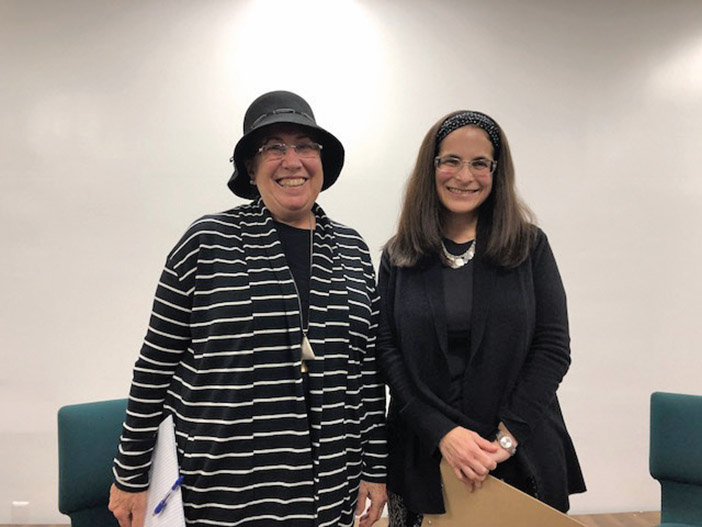

The inaugural Community Conversations presented by Ma’ayanot Yeshiva High School for Girls on Monday evening, October 22, featured Rabbanit Chana Henkin, founder and dean of the Nishmat Institute, a Torah-learning program for women in Yerushalayim. Rabbanit Henkin is also the founder of the yoetzet halacha program, which trains its American participants at Ma’ayanot during the summer. Ma’ayanot Principal Rivkah Kahan was a student at Nishmat and currently three yoatzot halacha are on the teaching staff at Ma’ayanot: Dena Block, Devora Dawidowicz and Shifra Friedman.The evening was sponsored by Dr. Helene Linder in a gesture of gratitude to Ma’ayanot, from which her daughter Sarah graduated in 2014, and Nishmat, where Sarah spent her gap year in 2015.
In opening the program, Rabbi Zev Prince, assistant principal for co-curricular life and rebbe of Talmud and Halacha, cited the blessing given by Hashem to Avraham in the week’s parsha in which he is told, “You will be a blessing,” that, in Avraham’s merit, the people will be blessed. Rabbi Prince suggested that in every generation we need people like Avraham with pioneering spirit to plant their feet firmly on the ground and bring about blessings to the people. He posited, “Had Nishmat not existed, Ma’ayanot would look very different from the way it looks today.”
Through a question and answer format, Rabbanit Henkin and Kahan were queried on a range of issues. In response to a question about the mission of the yoetzet halacha program, Henkin confidently responded that the program was created to help solve people’s problems. “Hashem would not choose an option that is not pleasant for people to follow. As we recite in our tefillot, d’racheha darchei noam, her ways are ways of pleasantness. Thus it is incumbent upon us to make Halacha as friendly as possible and to help people who are suffering relieve their problems.”
Henkin continued, “The way through which we can best help people is by encouraging the asking of questions. Teaneck’s yoetzet halacha, Tova Sinensky, has already responded to over 300 questions she has received since beginning her tenure three months ago. Nishmat has published its first volume of teshuvot, which responds to over 10,000 questions and was endorsed by a broad spectrum of rabbis.”
In response to the question as to whether the vision of Ma’ayanot will be changing with the passage of the years, Kahan responded, “Our mission is to make Torah speak to every young lady. Our methods may change with the times, but our primary goal is that Torah speak to our girls and that they have a home in Torah through our equipping them with the ability to study and explore.”
Kahan asked Henkin to comment on what actually happens during the students’ gap year in Israel. Henkin responded, “The girls witness Torah as a reality in Israel. As they come to us in their formative years, they are ‘shaken up’ by seeing people who visibly include Hashem in their lives. They experience Erev Shabbat and Erev Chag as holy days in themselves. And hopefully, as they have greater autonomy during their gap year, they make Torah their own choice. The teachers and staff at Nishmat are always available to answer their questions and address their spiritual needs, often through personal relationships.”
When asked how she would advise parents to select a gap year program best suited to their daughters, Henkin suggested, “Look at your own family’s values and select two to three that are most valuable to you and that you would want to be inculcated into your daughter’s studies. Select a program that most closely embodies these values.”
Previously that day, Henkin addressed the 11th and 12th graders and was received with great enthusiasm. She described to them the Shabbat environment at Nishmat, which includes a Friday night tish and davening in both the Ashkenazi and Eidot Hamizrach liturgies. She described the nightly pre-Rosh Hashanah selichot at Nishmat as special times for song and meditation.
To learn more about the many programs of the Nishmat Institute, email [email protected].
By Pearl Markovitz
�










